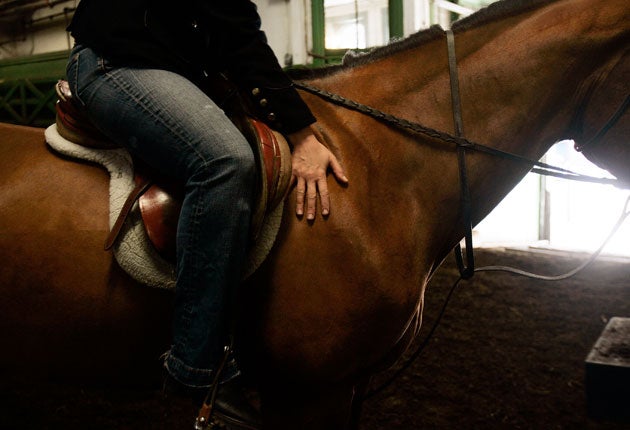In a recession, they shoot horses, don't they?
Economic woes mean a grim winter ahead for riders and their mounts

Hundreds of horse owners may have their mounts shot this winter as the recession hits owners who can no longer cope with the financial burden of feeding and stabling.
With the annual average cost of keeping a single horse running at around £5,000, animal charities have reported a surge in people asking for help. Shelters around the country are filling up and having to turn horses away. The cost of hay and feed through the winter is expected to be the breaking point for many owners already under financial strain.
The outlook is particularly bleak for those with older mounts, which are proving almost impossible to sell in the current climate. Charities are already overstretched and cannot cope with the numbers of animals needing to be rehomed.
Even those owners who have their animals destroyed face heavy bills, with it costing between £300 and £800 to dispose of a horse, according to the British Equestrian Veterinary Association.
Nicolas De Brauwere, chairman of the National Equine Welfare Council, the umbrella organisation for horse rescue centres and sanctuaries in the UK, said: "This winter we may well see the real impact of the recession on horse welfare, as the number of those people who can't afford it increases."
The Horse Trust charity this year had to close its doors for the first time to new arrivals – "as a consequence of the current financial climate, a reduction in donations and the falling value of legacy income", according to its chief executive, Paul Jepson.
Just last week one shelter, Canterbury Horse Rescue, issued a desperate plea for £3,000 towards the costs of looking after horses over the winter and to avoid closure.
The Horse Trust has seen a rising number of requests for help – currently running at around 10 every day. Last year, it had an average of 20 requests a month. Some people are cutting back on all of their own spending, even on basics such as food, to enable them to look after their horse, according to the charity.
In response to the crisis, the British Horse Society plans to launch its first loan scheme next year, to help place unwanted horses with people who can afford to care for them.
And making ends meet has been a common theme at the "Your Horse Live" show at Stoneleigh Park in Warwickshire this weekend. Julianne Aston, founder of the Veteran Horse Society and a speaker at the event, said: "I've been inundated with questions from people worried about how they can afford to keep their horse."
But for some it is too late. Professor Derek C Knottenbelt, an equine veterinary expert based at the University of Liverpool, said having some animals shot should be a "viable option" for anyone with a horse that they can neither keep nor sell.
"It is a justifiable and often sensible way of ensuring that the horse is not subjected to ongoing cruelty and neglect," he said.
Kathryn Brinnand (pictured inset), 43, from Macclesfield, Cheshire, has owned her 20-year-old horse, Jane Doe, for 13 years. She has been unable to find work as a conveyancer since taking a career break in 2007.
"Friends and professionals have been really good to me. 'Just pay me when you can' has been the answer from the livery stables and my farrier. I have suffered sleepless nights, and a permanent pain in my left arm because I haven't been able to pay them and it's just awful, particularly when you know that they are struggling themselves. I relocated Jane Doe a couple of weeks ago to a private stable that is caring for her at cost. I don't know how I am going to pay them at the end of this month because, apart from myself, I have sold everything.
"Horse charities and welfare organisations are full, their advice is to have your horse put down and while that is unbearable for any horse owner to consider it is better to do so than to let an animal suffer.
"My only consolation is the knowledge that I am not alone. There are thousands of horse owners and equestrian businesses struggling to survive."
Join our commenting forum
Join thought-provoking conversations, follow other Independent readers and see their replies
Comments
Bookmark popover
Removed from bookmarks